Your search “Keep%20the%20death%20penalty%abolished%20in%20the%20ePhilippfines%20e%20e%20e%20e%20e%20e%20e%20e%20e%20e/page/www.humanrights.asia/resources/report/2011/AHRC-sur-008-2011/act_download/file ”

Article(s)
Taiwan visit tarnished by six executions
By Patrick Kamenka, on 25 April 2013
The meeting of the World Coalition Steering Committee on 12 and 13 April 2013 in Taipei, attended by twenty people, was tarnished the same week by the execution of six prisoners sentenced to death, even though high-level assurances had been given by the State with regard to reducing such barbarous acts.
2013
Death Row Conditions
Public Opinion
Taiwan
Taiwan

Article(s)
New Hampshire: 21st State to Abolish the Death Penalty in the USA
By Aurelie Placais, on 12 June 2019
On 30 May 2019, the NH state Senate voted to override the governor’s veto. The death penalty repeal took effect immediately.
2019
United States
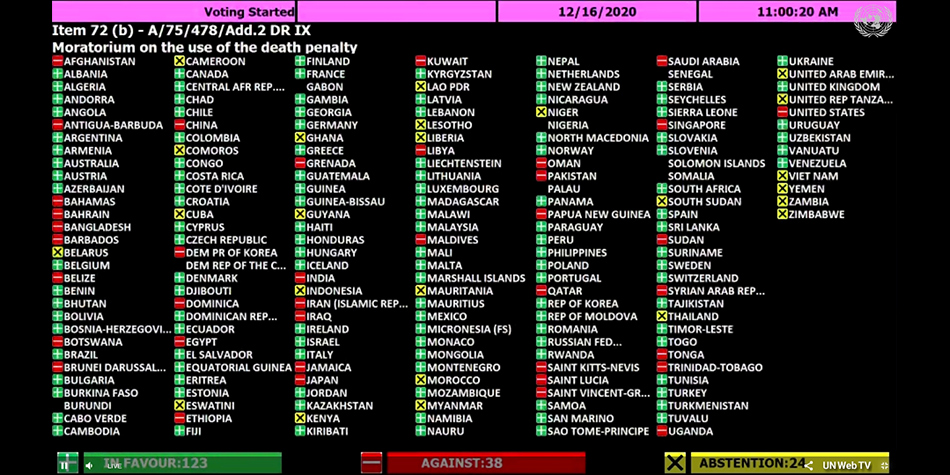
Article(s)
Statement on the Adoption of the 8th UN General Assembly Resolution for a Moratorium on the Use of the Death Penalty
By World Coalition Against the Death Penalty, on 17 December 2020
The World Coalition Against the Death Penalty warmly congratulates the United Nations General Assembly (UNGA) on the adoption of Resolution A/RES/75/183 for a moratorium on the use of the death penalty, which was adopted by a great majority of 123 UN Member States on 16 December 2020.
2020
Moratorium
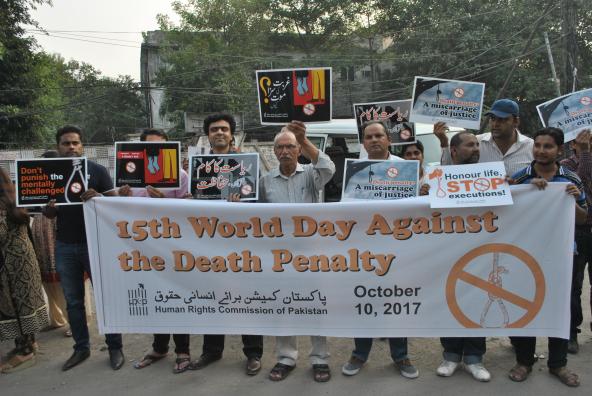
Article(s)
Abolitionists fight against the abusive use of the death penalty
By Thalia Gerzso, on 28 November 2017
In October 2017, Pakistan has agreed to initiate efforts to narrow down the scope of the death penalty. This first step is the result of a strong mobilization from Pakistani and international organizations, in particular during World Day.
2017
Pakistan
Public Opinion
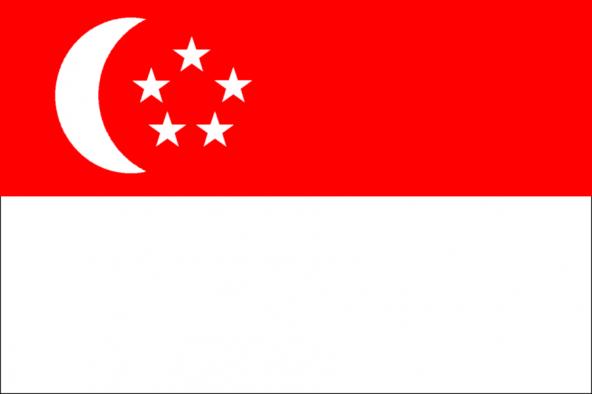
Article(s)
Singapore Executes People Sentenced to Death for Non-violent Crimes and Threatens their Lawyers
By Dinda Royhan, on 19 September 2019
On 13 July 2019, Think Centre reported that 32 executions have occurred in Singapore since it ended its moratorium on the death penalty in 2014. At the same time, lawyers defending capital cases have reported receiving threats from the government. As of the date of writing, Singapore is among 24 world states that have not ratified the ICCPR and its protocols.
2019
Drug Offenses
Legal Representation
Singapore
Article(s)
Can the US move towards abolition under Obama?
on 20 January 2009
The new president’s nominee for the post of attorney general opposes the death penalty and the number of executions and sentences is falling in the US.
2009
United States

Article(s)
Papua New Guinea: one step away from full abolition of the death penalty
By Aurélie Plaçais, World Coalition Against the Death Penalty, on 21 January 2022
Papua New Guinea’s National Parliament voted to repeal the death penalty on 20 January2022. The bill has now to be signed into law and to be published in the official gazette.
2022
Moratorium
Papua New Guinea
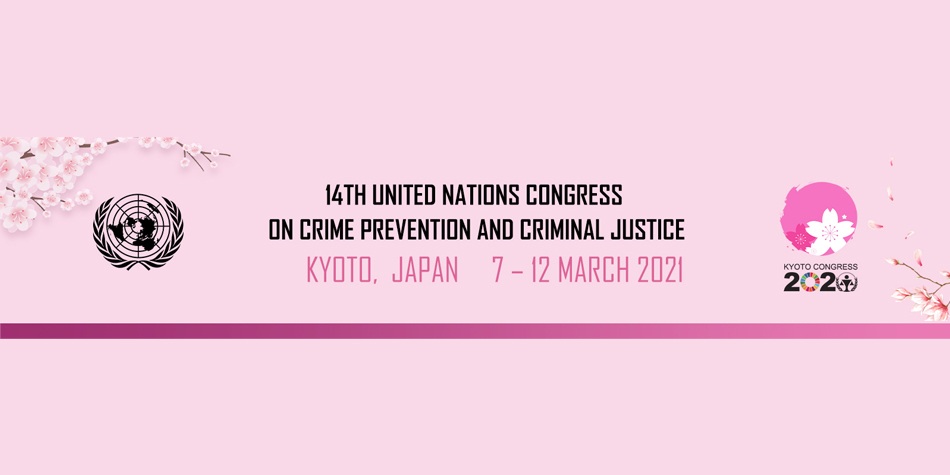
Article(s)
Recapping the UN Crime Congress in Kyoto
By Teppei Ono, CPR, on 15 March 2021
The United Nations Congress on Crime Prevention and Criminal Justice was held in Kyoto, Japan from 7 to 12 March 2021.
2021
Public Opinion
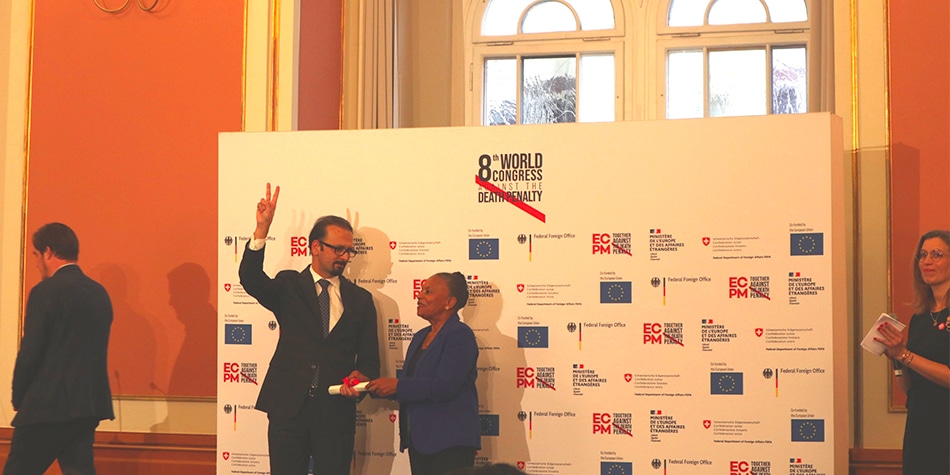
Article(s)
A Very Moving and Inspiring Closing Ceremony
By Dunia Schaffa, on 30 January 2023
The Closing Ceremony of the 8th World Congress celebrated people who play an immense role in the process of the abolition of the death penalty, with an awards ceremony and a tribute.
2023
Trend Towards Abolition
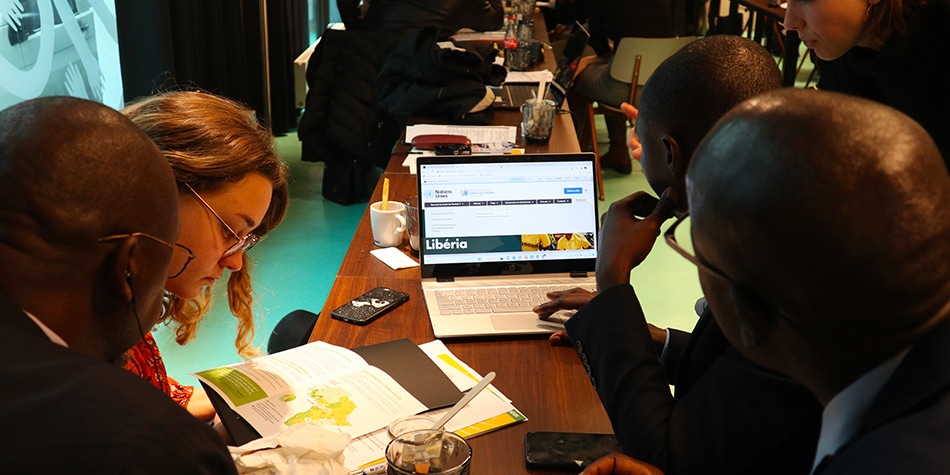
Article(s)
Advocacy Seminar Held in Berlin for French-Speaking Sub-Saharan Africa Members
By World Coalition Against the Death Penalty, on 26 January 2023
In the margins of the 8th World Congress Against the Death Penalty, member organizations of the World Coalition Against the Death Penalty (World Coalition) and FIACAT’s African ACATs (Féderation international des Action des Chrétiens pour l’abolition de la torture) met in Berlin, Germany for an advocacy seminar.
2023
Benin
Burkina Faso
Cameroon
Central African Republic
Chad
Congo
Côte d'Ivoire
Democratic Republic of the Congo
Guinea
Madagascar
Mali
Niger
Senegal
Togo

Article(s)
Central African Republic Becomes 24th African State to Abolish the Death Penalty
By ACAT-RCA, ECPM, FIACAT, on 26 June 2022
The President of the Central African Republic promulgated the law abolishing the death penalty on June 27 2022, one month after the National Assembly passed the law. CAR is now the 24th abolitionist state in Africa and the 111th in the world.
2022
Central African Republic
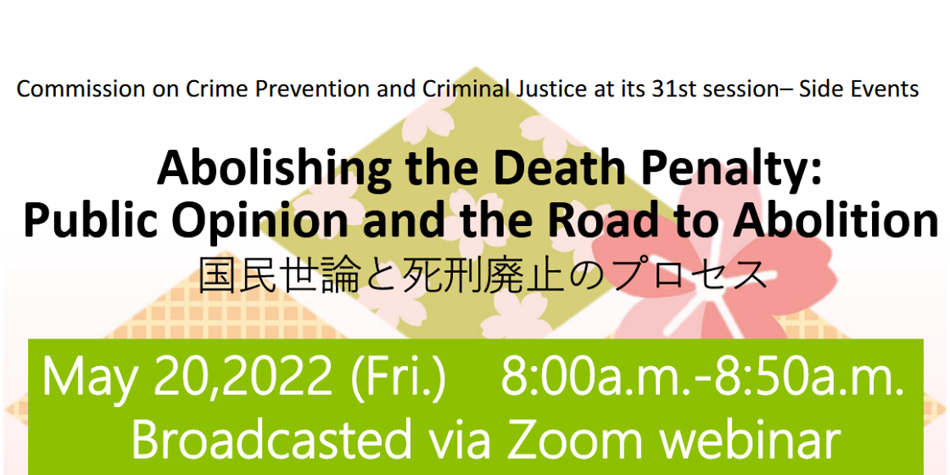
Article(s)
Public opinion supportive of the abolition
By Sarah Saint-Sorny, on 10 June 2022
The 31st Session of the Commission on Crime Prevention and Criminal Justice of the ODC took place in Vienna from the 16th to the 20th of May 2022. At this occasion, the Japan Federation of Bar Associations organized a side-event: “Abolishing the Death Penalty: Public Opinion and the Road to Abolition”, which was held online […]
2022
France
Japan
Public Opinion
United States
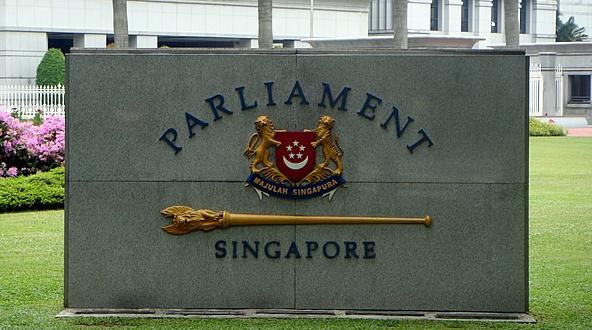
Article(s)
Singaporean and Malaysian activists welcome changes in their country
By World Coalition Against the Death Penalty, on 16 July 2012
In Singapore and Malaysia, governments are considering removing mandatory death penalty in some drug and murder cases. A move welcomed by activists on the ground, though they consider it “only a small step in the right direction”.
2012
Drug Offenses
Malaysia
Singapore

Article(s)
Saudi Arabian Mass execution of 81 men
By Anissa Aguedal, World Coalition Against the Death Penalty, on 4 April 2022
Saudi Arabia: the largest mass execution in this country in years The kingdom of Saudi Arabia executed 81 men on March 12, 2022, all of whom had been convicted of a wide range of offences, including “terrorism”- related crimes, murder, armed robbery, and arms smuggling. Those put to death included seven Yemenis, one Syrian and […]
2022
Moratorium
Public Opinion
Saudi Arabia

Article(s)
Calling Upon the Council of Paris to Overhaul Bahrain-Owned Paris FC’s Subsidy
By Americans for Democracy and Human Rights in Bahrain, on 5 February 2021
This Tuesday, on February 2, 2021, the Council of Paris will announce its position on the renewal of the yearly €500,000 subvention allocated to the Paris FC.
2021
Bahrain
Cruel, Inhuman and Degrading Treatment and Punishment
Moratorium
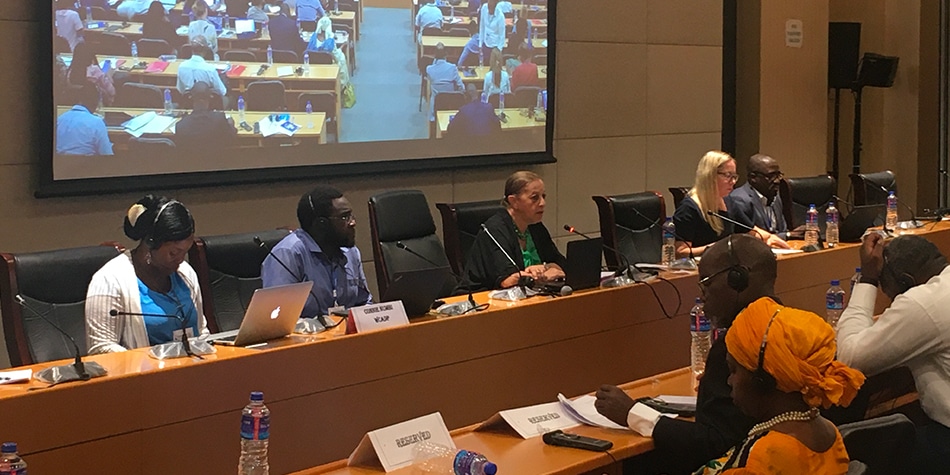
Article(s)
73rd Ordinary Session of the African Commission of Human and Peoples’ Rights: In- Person, Advocating Against the Death Penalty
By Bronwyn Dudley & Connie Numbi, on 16 December 2022
After nearly 3 years, the ACHPR (African Commission on Human and Peoples’ Rights) met in-person in Banjul, The Gambia to hold their 73rd Ordinary Session from 21st October – 10th November 2022.
2022
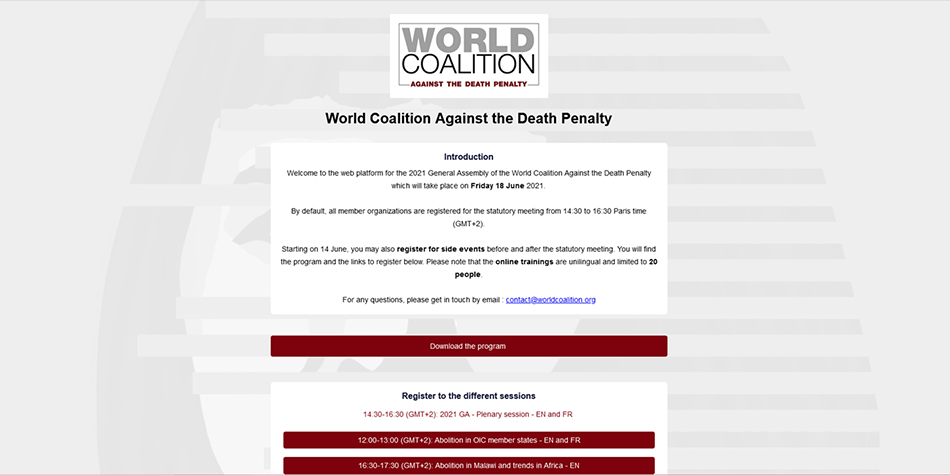
Article(s)
Program of the 18 June 2021 General Assembly
By World Coalition Against the Death Penalty, on 15 June 2021
If you are a member organization, join the fantastic program we will have on Friday 18 June!
2021
Juveniles
Women

Article(s)
In support and solidarity with “No Death Penalty Tuesdays” abolitionist movement in Iran
By World Coalition Against the Death Penalty, on 28 August 2024
Every six hours, one person was executed in Iranian prisons in the first 20 days of August. Execution numbers have been rising every year since 2021, with at least 834 people executed in 2023, and 395 executions recorded by Iran Human Rights as of 26th August 2024.
2024
Iran (Islamic Republic of)
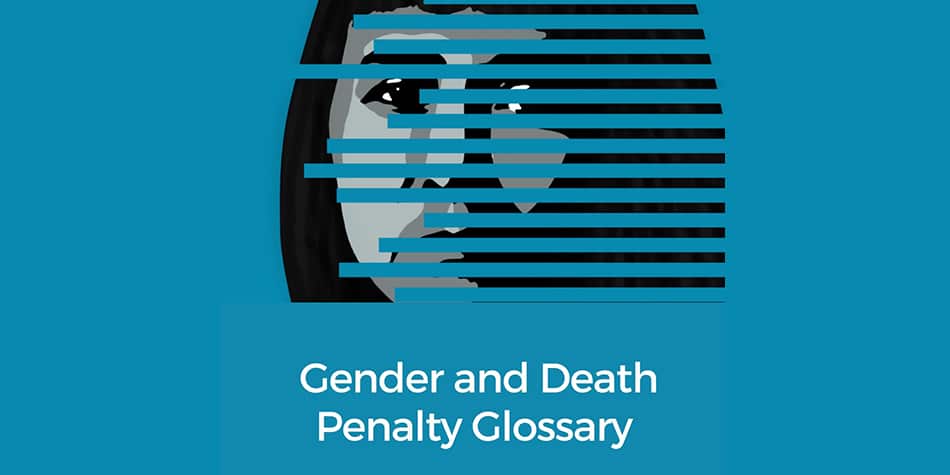
Article(s)
World Coalition launches glossary on gender and the death penalty
By World coalition against the deaht penalty, on 15 August 2023
As part of its efforts to mainstream a gender lens in the abolitionist movement, the World Coalition Against the Death Penalty just released a glossary on gender and the death penalty. The first of its kind, this publication presents and defines terms relevant to gender-sensitive abolitionist work that recognize the various forms of gender-based discrimination […]
2023
Gender

Article(s)
Why Jordan resumed executing people on the death row?
By Hend Hanafy, Faculty of Law, University of Cambridge, on 18 April 2018
For eight years since June 2006, Jordan was adopting a moratorium on the death penalty. However, on the 21st of December 2014, 11 people were hung in Swaqa Prison, thus, triggering questions about the timing and the reasons behind the resumption of the death penalty in Jordan. It is arguable that the internal political pressures on the government have fuelled this setback which was further eased through the international political opportunity of Jordan’s role in the war on terrorism.
2018
Jordan

Article(s)
Day of the Endangered Lawyer: spotlight on China
By Emmanuel Trépied, on 14 February 2017
24 January 2017 was the Day of the Endangered Lawyer. This international initiative was dedicated to the harassment undergone by Chinese lawyers.
2017
China
Cruel, Inhuman and Degrading Treatment and Punishment
Legal Representation
Article(s)
Taiwan abolitionists remind their government of its promise
on 13 March 2011
After fresh executions, the Taiwan Alliance to End the Death Penalty has been campaigning to save the lives of five condemned prisoners, recalling the government to its commitments to human rights.
2011
Clemency
Death Row Conditions
Taiwan
Taiwan

Article(s)
“We need to feel the reality of the death penalty”
By Lauranne Mailhabiau, on 22 June 2015
So said Raphael Chenuil Hazan, director of ECPM, at the opening ceremony of the Asian Regional Congress in Kuala Lumpur.
2015
Indonesia
Malaysia
Public Opinion
Taiwan
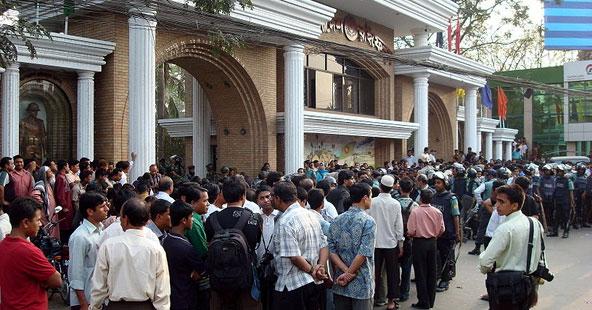
Article(s)
Abolitionist community appalled at Bangladeshi court ruling
By Emile Carreau, on 8 November 2013
A Bangladeshi court has sentenced 152 people to death and 161 others to life in prison on 5 November for a mutiny in Dhaka in 2009 (photo). High profile abolitionists have berated the decision.
2013
Bangladesh
Death Row Conditions
Article(s)
Chinese death penalty targets minorities
on 19 November 2009
The recent execution of several Uyghurs and Tibetans after ethnic clashes in China was met with severe international criticism.
2009
China
Fair Trial
Legal Representation
Article(s)
Filming in the darkness of China’s death row
on 17 September 2008
Night Train, a Chinese film featuring a couple faced with the absurdity of the death penalty, is coming out in DVD.
2008
China
Death Row Conditions

Article(s)
Executions in Jordan and Pakistan show need to go beyond moratorium
By Thomas Hubert, on 16 January 2015
The World Coalition and its members have criticised decisions by the governments of Jordan and Pakistan to reverse their policy of suspending executions despite a historic vote in favour of a moratorium on the use of the death penalty at the UN General Assembly.
2015
Jordan
Moratorium
Pakistan

Article(s)
Singapore arrests writer over death penalty book
on 20 July 2010
The British author of a book on Singapore’s death penalty is facing prosecution for criticizing the massive use of capital punishment in the Asian city-state.
2010
Drug Offenses
Singapore
Article(s)
Resumption of executions in Thailand criticised
on 3 September 2009
The Thai government has attracted widespread condemnation from the global abolitionist movement after it had two drug traffickers executed.
2009
Drug Offenses
Thailand
Article(s)
Taiwan visit raises hopes of local abolitionists
on 9 July 2008
A recent visit to Taiwan by a joint World Coalition-ADPAN delegation left the impression that the Asian island was on course to “join a global trend towards abolition of the death penalty”, as was reported in the local media.
2008
Public Opinion
Taiwan
Taiwan
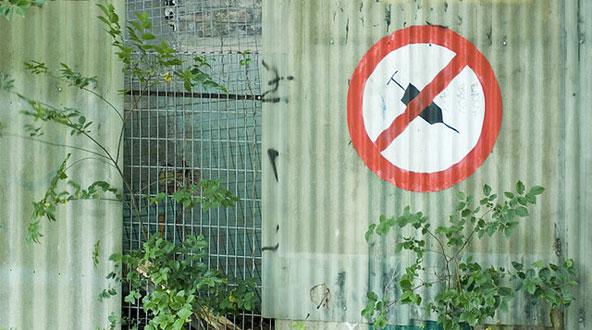
Article(s)
The shared responsibility of capital punishment
on 27 September 2011
Everyone agrees that the highest international standards should apply in the fight against drug. But what about the standards used in punishing traffickers- and the inappropriate use of the death penalty against such criminals?
2011
Australia
Bhutan
Colombia
Drug Offenses
Indonesia
Italy
Mozambique
Nepal
Niue
Pakistan
Philippines
South Africa
State of Palestine
Sweden
Taiwan
Terrorism
Thailand

Article(s)
Second Optional Protocol: Frequently Asked Questions
By Pierre Desert, on 27 June 2008
What is it? How is it implemented? You will find the answers to the most frequently asked questions about the Second Optional Protocol below.
2008
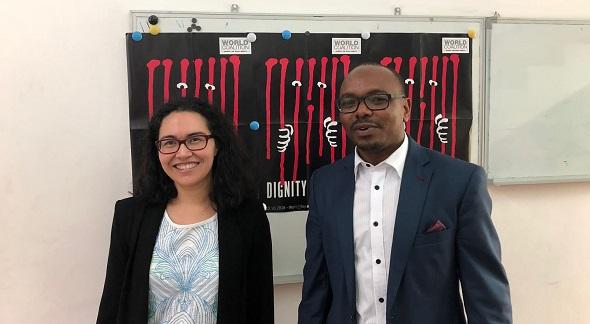
Article(s)
Hope resonates globally on World Day against the Death Penalty
By Nicolas Chua, on 25 October 2018
On 10 October 2018, abolitionist forces around the world celebrated the 16th World Day against the Death Penalty in a flurry of diverse activities and events meant to raise awareness on living conditions on death row. Activists in every continent mobilized civil society, challenged governments and reached out to the general public in a collective effort to promote and advance the common goal of universal, worldwide abolition of the death penalty.
2018
Death Row Conditions

Article(s)
TAIWAN: CONSTITUTIONAL COURT TO HEAR CHALLENGE TO DEATH PENALTY LAW
By World coalition against the death penalty, Amnesty International, on 23 April 2024
On 23 April 2024 the Constitutional Court of Taiwan will hear a challenge on the constitutionality of the death penalty in the country. Amnesty International Taiwan and the World Coalition Against the Death Penalty are among several non-governmental organizations intervening in the case, in support of the full abolition of the death penalty.
2024
Taiwan

Article(s)
Reflecting on the links between the death penalty and gender-based violence
By World Coalition Against the Death Penalty, on 25 November 2022
On 25 November 2022, International Day for the Elimination of Violence against Women, the World Coalition Against the Death Penalty, through the testimony of representatives of abolitionist member and partner organizations, wishes to raise awareness of the links between the death penalty and violence against women and gender minorities and call out the unjust and […]
2022
Gender
Kenya
Sri Lanka
Uganda
Women

Article(s)
Abolition of the death penalty at the 50th session of the UN Human Rights Council
By Anissa Aguedal, on 19 August 2022
The United Nations Human Rights Council met for its 50th Regular Session from June 13 to July 8, 2022. If you missed it, here is what happened regarding the abolition of the death penalty!
2022

Article(s)
Abolition of the death penalty at the United Nations Human Rights Council 53rd session
By World coalition against the death penalty, on 18 September 2023
The United Nations Human Rights Council met for its 53rd Regular Session from June 19 to July 14, 2023. If you missed it, here is what happened regarding the abolition of the death penalty!
2023
Trend Towards Abolition
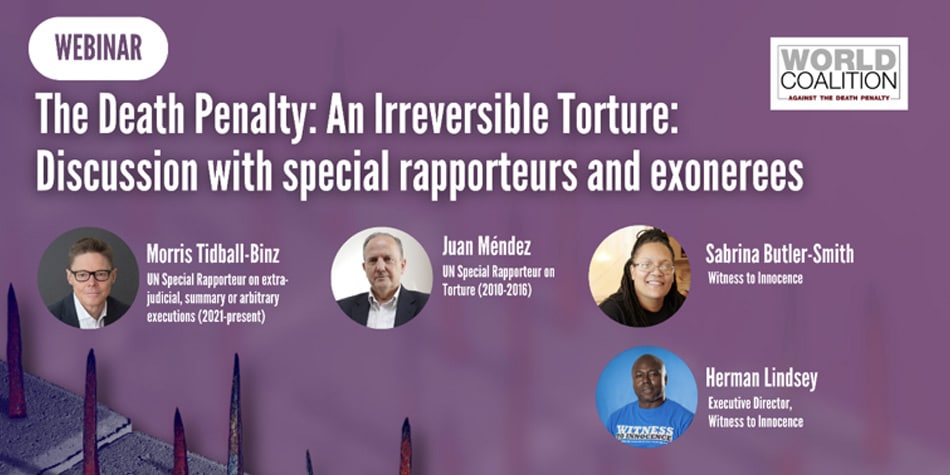
Article(s)
Highlights: Discussion on torture and the death penalty with UN experts and exonerees
By Venus Aves, on 6 November 2023
For the 21st World Day Against the Death Penalty dedicated to the reflection on the relationship between the use of the death penalty and torture or other cruel, inhuman, and degrading treatment or punishment started in 2022, the World Coalition hosted an online discussion with United Nations experts Morris Tidball Binz (UN Special Rapporteur on […]
2023
Cruel, Inhuman and Degrading Treatment and Punishment
Death Row Conditions
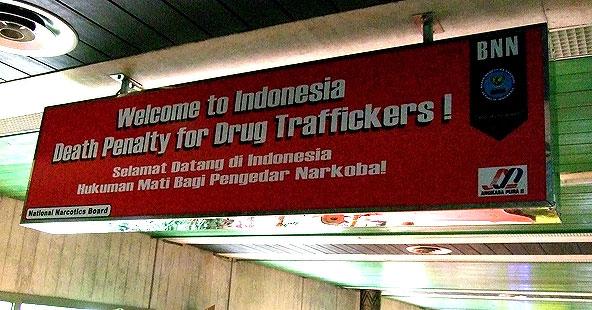
Article(s)
Indonesia: execution for drug crimes is no solution
By World Coalition Against the Death Penalty, on 26 January 2015
In an open letter, the World Coalition and its members, including KONTRAS and Amnesty International, condemn the Indonesian government’s politicizing of the death penalty to show its commitment to eradicating drug-related crimes. Recent resumptions of executions show one thing, they are carried out for political reasons only: in Pakistan to show that it is tough on terrorism, Jordan that it tough on crime and Indonesia that it is tough on drugs. Instead, those states should abolish the death penalty to show their commitment to upholding human rights. The next World Day against the Death Penalty will be dedicated to the issue of capital drug crimes.
2015
Drug Offenses
Indonesia
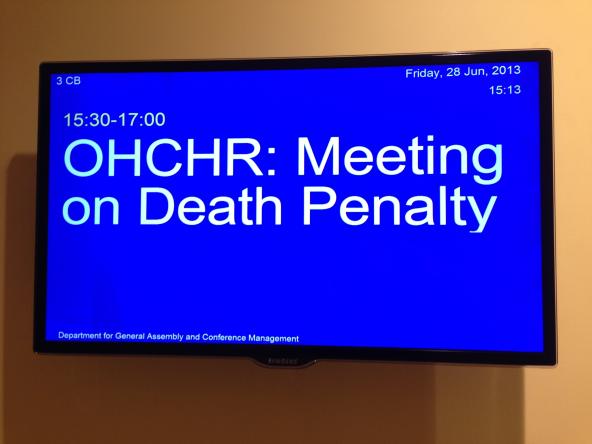
Article(s)
United Nations panel hears from innocent sentenced to death
By Maria Donatelli, on 4 July 2013
World Coalition members and a man who spent 18 years on death row for murders he did not commit joined UN Secretary General Ban Ki-Moon for a debate on capital punishment.
2013
Innocence
United States

Article(s)
Singapore must stop targeting HR defenders and media
By Aliran et al (Malaysiakini), on 20 February 2020
We, the 37 undersigned groups and organisations, and three individuals, are appalled by Singapore’s denial and response to the highlighting of alleged “barbaric” unlawful practices in execution method that was highlighted vide a Jan 16 media statement issued by Lawyers for Liberty (LFL).get to many more people when media reports on our statements.
2020
Singapore
Document(s)
Unfair trials report II: the death penalty is not the common value of Asia
By Taiwan Alliance to End the Death Penalty, on 1 January 2015
2015
Article
zh-hantMore details See the document
This report highlights the death penalty situation and executions in Asian countries between 2010 and 2013. It also gives an overview over the legal protection measures for the mentally impaired and intellectually disabled in Asian countries where the death penalty is used. Furthermore, we have listed Asian countries that have acceded to the ICCPR and its Second Optional Protocol. We have also collected excerpts from international human rights documents. By using these documents for mutual reference, death penalty activists in Asia will be able to get a more comprehensive picture of the use of the death penalty and executions in Asian countries.
- Document type Article
- Themes list International law, Public debate, Most Serious Crimes,
- Available languages 亞洲不公平審判報告 II : 死刑並非亞洲的共同價值
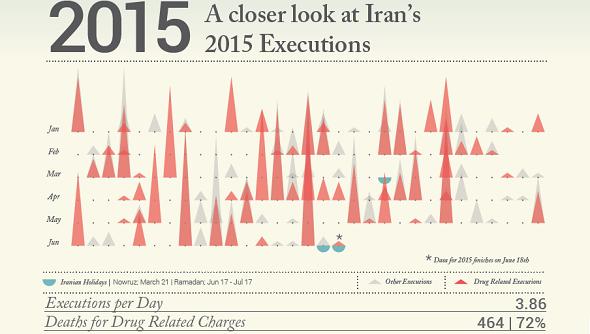
Article(s)
Iran: more than 800 people executed in 2015, 500 for drugs
By Iran Human Rights, on 13 October 2015
Ahead of the 13th World Day Against the Death Penalty, Iran Human Rights is raising awareness about the implementation of the death penalty in Iran for drug-related offenses. Reports from the IHR website indicate that Iranian authorities have carried out more executions in 2015 than any other year in the past 25 years.
2015
Drug Offenses
Iran (Islamic Republic of)
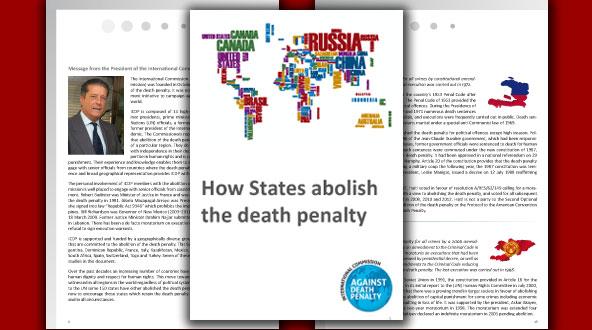
Article(s)
Study explores variety of national paths to abolition
By Thomas Hubert, on 3 May 2013
From courageous political leaders to traditional African values, the International Commission against the Death Penalty’s analysis of the factors leading to the abolition of capital punishment in 13 countries offers advice to retentionist countries.
2013
Cambodia
Haiti
Mongolia
Norway
Public Opinion
Rwanda
Senegal
South Africa
United States
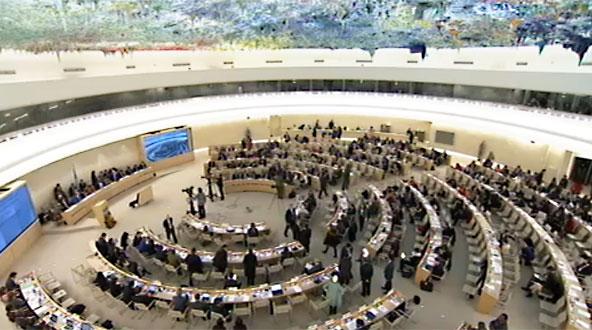
Article(s)
The United Nations Human Rights Council votes in favor of a new resolution on the death penalty
By Jessica Corredor, on 4 October 2017
After putting the death penalty at the heart of discussion, the 36th session of the United Nations Human Rights Council ended with the adoption of a resolution on the death penalty.
2017
Cruel, Inhuman and Degrading Treatment and Punishment
Document(s)
Issues and recommendations to raise with the government of Malawi
By Reprieve, Sant'egidio, WCADP, on 27 May 2021
2021
NGO report
Malawi
More details Download [ pdf - 265 Ko ]
Overview
This document has been prepared by the Community of Sant’Egidio, Reprieve and the World Coalition Against the Death Penalty to assist the Commissioners ahead of the 2nd/3rd periodic report of the Government of Malawi that covers the reporting period of 2015-2019.
- Document type NGO report
- Countries list Malawi
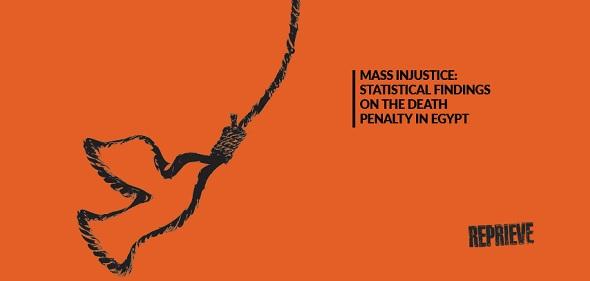
Article(s)
Increased use of the death penalty in Egypt since 2013
By Abdoul Razak Ahmadou Youssoufou, on 13 June 2019
Since the fall of the Morsi regime in 2013, the use of the death penalty has increased considerably in Egypt with a death sentence rate estimated at 2443 people between 2013 and 2018 according to Reprieve.
2019
Egypt
Article(s)
Translations in Chinese
By World Coalition Against the Death Penalty, on 21 January 2013
The World Coalition Against the Death Penalty’s office in Paris, France, is currently calling for translation contributions in Chinese.
The objective is to award contracts for translation services for the publications of the World Coalition Against the Death Penalty for 30 months (mid 2013 – mid 2015).
2013
Document(s)
Death sentences and executions in 2010
By Amnesty International, on 1 January 2011
2011
NGO report
fresMore details See the document
In the last decade, more than 30 countries have abolished the death penalty in law or practice. Fifty-eight countries worldwide now retain the death penalty for ordinary crimes, and less than half of these carried out executions in 2010. This report analyzes some of the key developments in the worldwide application of the death penalty in 2010, citing figures gathered by Amnesty International on the number of death sentences handed down and executions carried out during the year.
- Document type NGO report
- Themes list Statistics,
- Available languages Condamnations à mort et exécutions et exécutions en 2010Condenas a meurte y ejecuciones en 2010
Document(s)
(Not) Talking about Capital Punishment in the Xi Jinping Era
By Tobias Smith, Matthew Robertson and Susan Trevaskes, on 1 September 2022
2022
Academic report
China
More details See the document
An investigation into the death penalty in the People’s Republic of China in the Xi Jinping era (2012–) shows that unlike previous administrations, Xi does not appear to have articulated a signature death penalty policy. Where policy in China is unclear, assessing both the quality and frequency of discourse on the topic can provide evidence regarding an administration’s priorities.
This article was first published in Crime Justice Journal: https://www.crimejusticejournal.com/issue/view/119
- Document type Academic report
- Countries list China
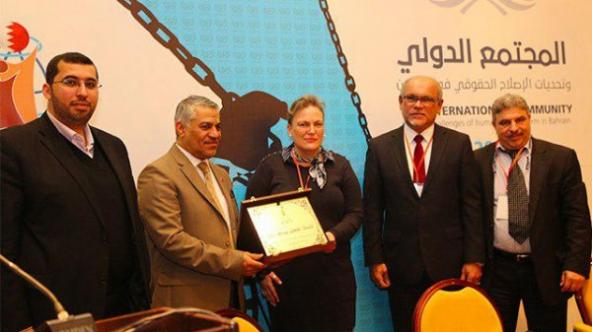
Article(s)
The 6th International Conference on Human Rights issues a warning on the alarming situation in Bahrain
By Emmanuel Trépied and Coalition marocaine contre la peine de mort, on 10 March 2017
The World Coalition was invited to take part in the 6th international Conference on Human Rights, on February 22nd, 2017 in Beirut. addressing the very worrying situation in Bahrain, the event resulted in a series of calls and recommendations.
2017
Bahrain
Cruel, Inhuman and Degrading Treatment and Punishment
Fair Trial
Moratorium
Terrorism
Document(s)
Race and Age Characteristics of those Sentenced to Death before and after Roper
By Frank R. Baumgartner, on 29 August 2022
2022
Academic report
frMore details Download [ pdf - 111 Ko ]
“The penalty of death is more likely to be imposed on individuals who suffer from various disadvantages: poverty, poor lawyers, mental illness, intellectual deficits, for example. It also is more common among those with white victims compared to minority victims, those who commit crimes in jurisdictions that have previously sentenced more individuals to death, and those who committed their crimes in the 1980s or 1990s as compared to more recent years (see Baumgartner et al. 2018 for details). In this short report I focus on two particular disadvantages: age and minority status.” – Frank R. Baumgartner
Link to the article: https://deathpenaltyinfo.org/news/report-racial-disparities-in-death-sentences-imposed-on-late-adolescent-offenders-have-grown-since-supreme-court-ruling-banning-juvenile-death-penalty
Document(s)
Broken Justice: The Death Penalty in Virginia
By Rachel King / American Civil Liberties Union / Virginia, on 1 January 2003
2003
NGO report
More details See the document
In April of 2000, the ACLU of Virginia published its first report on the status of the death penalty in Virginia. Since that time, a remarkable number of changes have taken place on this issue both in Virginia and throughout the country, which necessitated a second edition of the report. The first report examined four aspects of the administration of capital punishment in Virginia: prosecutorial discretion in the charging of capital crimes, quality of legal representation for the accused at trial, appellate review of trials resulting in the death penalty and the role of race. This report will look at those four areas and also add several other issues: the problem of prosecutorial misconduct in capital cases, the problem of executing mentally retarded offenders, the question of executing juvenile offenders and the danger of executing wrongfully convicted persons, as shown by the growing number of individuals who have been exonerated while on death row.
- Document type NGO report
- Themes list Country/Regional profiles,
Document(s)
Justice Denied : A Global Study of Wrongful Death Row Convictions January 2018
By Sandra Babcock / Cornell Law School / Madalyn Wasilczuk and Sharon Pia Hickey / Delphine Lourtau / Katie Campbell / Julie Bloch, on 1 January 2018
2018
Academic report
frMore details See the document
On March 7, 2018, the Cornell Center on the Death Penalty Worldwide launched its new report entitled Justice Denied: A Global Study of Wrongful Death Row Convictions at the United Nations in Geneva, Switzerland. The report is a first-of-its-kind comparative study of the risk factors that increase the likelihood of wrongful convictions. The report illuminates the similarities in wrongful conviction risk factors in six countries across the geographical and political spectrum: Cameroon, Indonesia, Jordan, Malawi, Nigeria, and Pakistan.
- Document type Academic report
- Themes list Innocence, Death Row Conditions, Death Penalty,
- Available languages Déni de justice : Une étude mondiale sur les erreurs judiciaires dans les couloirs de la mort
Document(s)
International Perspectives on the Death Penalty: A Costly Isolation for the U.S.
By Death Penalty Information Center / Richard C. Dieter, on 1 January 1999
1999
NGO report
More details See the document
This report examines the sequence of recent events that has increasingly placed the death penalty in the international spotlight. Some of these events are direct challenges to the practice of capital punishment in the U.S. Others are changes in the balance of death penalty practices and attitudes around the world. The report looks at the ways in which the international community has sought to limit the application of the death penalty, and the U.S.’s response to these initiatives. It also explores the world-wide trend towards complete abolition of the death penalty and the U.S. reaction. Although much of the official U.S. response to international criticism has been denial, the report looks at some local and unofficial actions, which indicate a different direction. Finally, the report notes the present and potential costs the U.S. is facing for adhering to the death penalty.
- Document type NGO report
- Themes list Networks,
Document(s)
The Modern Federal Death Penalty: A Cruel and Unusual Penalty
By Hannah Freedman, on 1 September 2022
2022
Academic report
Cruel, Inhuman and Degrading Treatment and Punishment
United States
More details See the document
The federal death penalty today would be unrecognizable to the founders, who saw the ultimate penalty as a means of protecting sovereign interests and who therefore carefully guarded the practice at English common law of yielding national interests to local ones. Over the course of time, the geographic distribution and substantive basis for the penalty changed, but until the modern era, its underlying purpose did not. As the Trump era executions made painfully clear, however, the federal death penalty today is different. It is disproportionately imposed for crimes that could have readily been prosecuted by other jurisdictions and that have little obvious connection to federal sovereignty, and it is disproportionately imposed against non-white people. By any rational measure, it is vanishingly rare, and it serves no valid penological goal. Simply put, federal death sentences today are, in most cases, “cruel and unusual in the same way that being struck by lightning is cruel and unusual.”
- Document type Academic report
- Countries list United States
- Themes list Cruel, Inhuman and Degrading Treatment and Punishment
Document(s)
Georgian : უვადო თავისუფლების აღკვეთისა და გრძელვადიანი სასჯელების გამოყენება და აღსრულება საქართველოში
By Penal Reform International / Tsira Chanturia / Maia Khasia / Jacqueline Macalesher, on 8 September 2020
2020
NGO report
ruMore details See the document
საქართველოში ბოლო განაჩენი სიკვდილით დასჯის შესახებ აღსრულებულ იქნა სავარაუდოდ 1992/93 წლებში. სიკვდილით დასჯილთა შესახებ სტატისტიკურიინფორმაცია გამოთხოვილ იქნა სასჯელაღსრულების პრობაციისა და იურიდიული დახმარების სამინისტროს სასჯელაღსრულების დეპარტამენტიდან, თუმცა მიღებული პასუხის თანახმად, აღნიშნული ინფორმაცია ვერ იქნა მოძიებული
- Document type NGO report
- Themes list Trend Towards Abolition,
- Available languages Отмена смертной казни и альтернативные наказания на Южном Кавказе: Азербайджан, Армения, Грузия
Document(s)
Initiatives World Day 2006
By World Coalition against the death penalty , on 10 October 2006
2006
Campaigning
Trend Towards Abolition
frMore details See the document
Initiatives World Day 2006
- Document type Campaigning
- Themes list Trend Towards Abolition
- Available languages Initiatives journée mondiale 2006
Document(s)
Tanzania Human Rights Reports 2009: Incorporating Specific Part on Zanzibar
By Clarence Kipobota / Legal and Human Rights Centre, on 1 January 2010
2010
NGO report
More details See the document
The statistical information suggests that despite the executions that were done between 1961 and 1995, incidents of offences punishable by the death penalty were increasing and are still on the rise, from 46 convicts in 1961 to 2,562 in 2007. This report briefly describes the death penalty system in Tanzania.
- Document type NGO report
- Themes list Statistics,
Document(s)
The Death Penalty in the OSCE Area: Background Paper 2019
By Organization for Security and Co-operation in Europe (OSCE), on 1 January 2019
2019
International law - Regional body
More details See the document
Fifty-five (55) OSCE participating States have either completely abolished the death penalty or maintain moratoria on executions as an important first step towards abolition. However, in a global context where discussions focus on the threat of terrorism and a need to be tough on crime, it is perhaps not surprising that the question of reintroducing the death penalty surfaces at times, including in the OSCE region. It is, therefore, a good moment to reflect on the reasons why there is still support for the death penalty, considering the growing understanding that capital punishment is a cruel, inhuman and degrading punishment. Some of the most persistent arguments used to justify the use of the death penalty and its possible reintroduction will be discussed in the report.
- Document type International law - Regional body
- Themes list Trend Towards Abolition,
Document(s)
Public Opinion and the Death Penalty Guide
By The Death Penalty Project, on 1 November 2022
2022
NGO report
Public Opinion
More details See the document
When faced with calls to join the majority of states worldwide that have now abolished capital punishment, a key justification, typically relied upon by retentionist states, is that their citizens are not yet ready for abolition, and that political leaders must represent ‘the will of the people.’ The Death Penalty Project produced this resource on public opinion and the death penalty.
- Document type NGO report
- Themes list Public Opinion
Document(s)
Little Furmans Everywhere: State Court Intervention and the Decline of the American Death Penalty
By Carol S. Steiker & Jordan M. Steiker, on 1 September 2022
2022
Academic report
Trend Towards Abolition
United States
More details See the document
This article retraces the evolution and recent decline of death peanlty in the United States, notablt through state court interventions. These dynamics between judicial and political action illuminate the importance of state court intervention in the story of the American death penalty’s precipitous decline, which has tended to foreground other institutional actors and to neglect the complex interactions among branches of government. State judicial rulings, though often highly technical and, therefore, less visible and accessible to the public, have been a pervasive and powerful force in the two-decade-long diminution of the practice of capital punishment across the United States.
- Document type Academic report
- Countries list United States
- Themes list Trend Towards Abolition
Document(s)
ISOLATION AND DESOLATION CONDITIONS OF DETENTION OF PEOPLE SENTENCED TO DEATH MALAYSIA – Bahasa Melayu
By Carole Berrih, Ngeow Chow Ying, ECPM, ADPAN, on 27 May 2021
2021
NGO report
Death Row Conditions
Malaysia
More details See the document
Isolation and Desolation – Conditions of Detention of People Sentenced to Death in Malaysia is the first ever fact-finding mission report on the conditions of detention of death row prisoners in Malaysia.
It examines the use of death penalty in Malaysia as well as the actual situation of people on death row.
This report is not meant to point fingers but rather to put the facts on the table in a transparent manner and work from there. It is mainly an advocacy tool for all abolitionist stakeholders, from civil society actors to the parliamentarians who will keep fighting for the abolition of the death penalty.
—————————————
Isolation and Desolation – Conditions of Detention of People Sentenced to Death di Malaysia adalah satu-satunya laporan berasaskan misi mengkaji fakta (fact-finding mission) mengenai keadaan-keadaan penahanan bagi banduan-banduan hukuman mati di Malaysia.
Laporan ini mengkaji pelaksanaan hukuman mati di Malaysia dan juga keadaan sebenar orang-orang yang dijatuhkan hukuman mati.
Laporan ini bukan bertujuan untuk menunding jari terhadap mana-mana pihak, tetapi bertujuan untuk memberi pencerahan kepada fakta-fakta yang ditemui dan berusaha ke atasnya. Laporan ini bertujuan utama sebagai alat advokasi kepada semua pihak yang mempunyai kepentingan dalam pemansuhan, bermula dari ahli persatuan kemasyarakatan sehingga ahli parlimen yang akan berusaha berterusan untuk memansuhkan hukuman mati.
- Document type NGO report
- Countries list Malaysia
- Themes list Death Row Conditions
Document(s)
AEDPA Repeal
By Brandon L. Garrett & Kaitlin Phillips, on 1 September 2022
2022
Academic report
Terrorism
United States
More details See the document
Given how pressing the problem has become, and the real interest in reforms to promote access to justice, this article takes a different tack than prior habeas reform work: to restore habeas corpus to its pre-AEDPA and pre-Rehnquist court state, in which a federal court can review claims and reach their merits. The approach would preserve flexibility at the district court level and remove the many layers of procedural complexity that the Supreme Court and then Congress have erected. We believe that deep changes are needed, and in that, we agree with judges and scholars that have for some time proposed such changes in the writ. As we describe, AEDPA was enacted as a culmination of more than two decades of complex Supreme Court law that had already limited access to federal habeas corpus. While AEDPA incorporated some of those procedural rulings, the concern would be that should AEDPA be repealed, even in part, those court-made restrictions could be interpreted to supplant AEDPA restrictions. Clear statutory language will be needed to ensure that the Court does not frustrate Congress, as it has in the past, by supplementing statutory text in order to limit constitutional remedies. We do not mean to suggest that the various proposals set out here are exhaustive. Our goal is to promote careful considerations of alternatives to the present-day set of federal habeas corpus statutes and accompanying judicial interpretation.
- Document type Academic report
- Countries list United States
- Themes list Terrorism
Document(s)
The death penalty worldwide developments in 2007
By Amnesty International, on 1 January 2008
2008
NGO report
fresarMore details See the document
In 2007 the world continued to move closer to the universal abolition of the capital punishment. A historical landmark is the resolution on a moratorium on executions endorsed by the United Nations. By the end of the 2007, 91 countries have abolished the death penalty for all crimes. The death penalty has now been abolished in law or practice by 135 countries. Other subjects covered in this report include commutations, judicial reviews, use against child offenders; and extradition.
- Document type NGO report
- Themes list Statistics,
- Available languages La peine de mort dans le monde : évolution en 2007LA PENA DE MUERTE EN EL MUNDO: NOTICIAS DEL AÑO 2007تطورات عقوبة العدام على النطاق العالمي في 2007
Document(s)
Legislators’ Opinions on the Death Penalty in Taiwan
on 24 March 2022
2022
NGO report
Public Opinion
Taiwan
zh-hantMore details See the document
In 2021, The Death Penalty Project and the Taiwan Alliance to End the Death Penalty (TAEDP) commissioned Professor Carolyn Hoyle at the University of Oxford and Professor Shiow-duan Hawang at Soochow University, Taipei to carry out a study exploring Taiwanese legislators’ attitudes towards capital punishment.
The study reveals that the majority of Taiwan’s legislators would like to see the death penalty abolished. The risk of wrongful convictions, the abuse of human rights and a recognition that the death penalty has no unique deterrent effect, were the primary reasons cited for supporting abolition. Additionally, a majority of legislators interviewed expressed fairly low levels of trust in the Taiwanese criminal justice system, with doubts raised over its ability to offer adequate safeguards to individuals facing capital trials.
Key findings:
– 61% of legislators interviewed are in favour of abolishing the death penalty
– 39% of legislators interviewed are in favour of retaining the death penalty, but only one legislator was strongly in favour
– 71% of retentionists and 65% of abolitionists asserted that wrongful convictions ‘sometimes’ occurred
– Only 11% of legislators interviewed thought that wrongful convictions ‘rarely’ occur
– All legislators interviewed expressed a preference for social justice measures, such as poverty reduction, over increased executions when asked to rank a range of policies aimed at reducing violent crime
- Document type NGO report
- Countries list Taiwan
- Themes list Public Opinion
- Available languages 台灣立法委員對死刑 之意見調查
Document(s)
The Last Holdouts: Ending the Juvenile Death Penalty in Iran, Saudi Arabia, Sudan, Pakistan, and Yeman
By Human Rights Watch, on 1 January 2008
2008
NGO report
arMore details See the document
In this 20-page report, Human Rights Watch documents failures in law and practice that since January 2005 have resulted in 32 executions of juvenile offenders in five countries: Iran (26), Saudi Arabia (2), Sudan (2), Pakistan (1), and Yemen (1). The report also highlights cases of individuals recently executed or facing execution in the five countries, where well over 100 juvenile offenders are currently on death row, awaiting the outcome of a judicial appeal, or in some murder cases, the outcome of negotiations for pardons in exchange for financial compensation
- Document type NGO report
- Themes list Juveniles,
- Available languages آخر المعاقلالقضاء على عقوبة إعدام الأحداث في إيران والمملكة العربيةالسعودية والسودان وباآستان واليمن
Document(s)
Caught in a Web Treatment of Pakistanis in the Saudi Criminal Justice System
By Human Rights Watch / Justice Project Pakistan, on 8 September 2020
2020
NGO report
Pakistan
More details See the document
Report about the treatment of Pakistanis in the Saudi criminal justice system
- Document type NGO report
- Countries list Pakistan
- Themes list Discrimination, Foreign Nationals,
Document(s)
Reporting on the death penalty: training resource for journalists
By Penal Reform International, on 1 January 2011
2011
NGO report
More details See the document
The aim of this resource is to build and strengthen the knowledge and raise awareness of journalists on how to report on the death penalty and alternative sanctions. This training resource has been developed in conjunction with PRI’s partner, Inter Press Services (IPS).
- Document type NGO report
- Themes list Public opinion, Networks,
Document(s)
Broken Justice: The death penalty in Alabama
By Rachel King / American Civil Liberties Union / Alabama, on 1 January 2005
2005
NGO report
More details See the document
This report documents unfairness and unreliability that plague the death penalty system in Alabama and makes several recommendations, including a moratorium on executions. The major areas of focus the report examines are: Inadequate Defence, Prosecutorial Misconduct, Judicial Overrides, Execution of the Mentallly Retarded, Racial Discrimination, and Geographic Disparities.
- Document type NGO report
- Themes list Country/Regional profiles,
Document(s)
Written Statement to the 20th Session of the Working Group on the Universal Periodic Review on Iran
By Iran Human Rights (IHR) / United Nations / World Coalition Against the Death Penalty / The Advocates for Human Rights / Abdorrahman Boroumand Foundation for the Promotion of Human Rights and Democracy in Iran / Association for Human Rights in Kurdistan of Iran-Geneva (KMMK-G), on 1 January 2014
2014
NGO report
More details See the document
This report is being submitted by Abdorrahman Boroumand Foundation, The Advocates for Human Rights, Iran Human Rights (IHR), Association for Human Rights in Kurdistan of Iran-Geneva (KMMK-G), and the World Coalition Against the Death Penalty, relevant stakeholders, in conjunction with the Universal Periodic Review of Iran by the United Nations Human Rights Council. Iran will be subject to review during the 20th session (October – November 2014). This report examines the imposition of the death penalty in Iran in light of international human rights standards. This report will also examine and discuss the judicial process applied in cases involving punishment by the death penalty. Reports and commentary indicate that there is a serious problem of access to justice for the vast majority of individuals accused of crimes for which the death penalty is a possible punishment. It has been compiled from a combination of sources, including the penal code, news reports, non-governmental organizations (NGOs), and other commentary.
- Document type NGO report
- Themes list Juveniles, Minorities, Religion , Due Process , International law, Capital offences, Right to life, Drug Offences, Foreign Nationals, Stoning, Statistics,
Document(s)
Terror on Death Row: The Abuse and Overuse of Pakistan’s Anti-Terrorism Legislation
By Reprieve / Justice Project Pakistan, on 8 September 2020
2020
NGO report
Pakistan
More details See the document
This report is a result of death row prisoner data from 38 prisons across Pakistan’s four provinces(Balochistan, Khyber Pakhtunkhwa (‘KPK ’),Punjab and Sindh. For most of Pakistan, the data runs to December 2012, thereby covering all those who are presently subject to execution dates. However, the report reflects further data on the province of Sindh running to October 2014
- Document type NGO report
- Countries list Pakistan
- Themes list Death Penalty, Country/Regional profiles,
Document(s)
Written Statement to the 22nd Session of the Working Group on the Universal Periodic Review on Malawi
By World Coalition Against the Death Penalty / The Advocates for Human Rights, on 1 January 2014
2014
NGO report
More details See the document
This submission informs on Malawi’s international human rights obligations with regard to its use of the death penalty. This report will also examine and discuss the judicial process applied in cases involving punishment by the death penalty. Reports and commentary indicate that there is a serious problem of prison conditions and access to justice for the vast majority of individuals accused of crimes for which the death penalty is a possible punishment. This report has been compiled from a combination of sources, including the Malawi Penal Code, experts, news reports, non-governmental organizations, and other commentary. Further, this report makes recommendations that steps be taken to alleviate such conditions. These steps include both reducing the maximum possible sentence from death to one that is fair, proportionate and respects international human rights standards, complete abolition of capital punishment, universal access to adequate legal representation and provision of clean, safe, and appropriate prison conditions as well as regular monitoring.
- Document type NGO report
- Themes list Due Process , Death Row Conditions, Country/Regional profiles,
Document(s)
Capital punishment and the implementation of the safeguards guaranteeing protection of the rights of those facing the death penalty
By United Nations, on 1 January 2017
2017
United Nations report
More details See the document
The present report is submitted pursuant to resolution 30/5 of the Human Rights Council. The report examines the consequences arising at various stages of the imposition and application of the death penalty on the enjoyment of the human rights of those facing the death penalty. It pays specific attention to the right to equality and non-discrimination in the context of the use of the death penalty. The report also highlights the discriminatory application of the death penalty to foreign nationals.
- Document type United Nations report
- Themes list International law, Right to life, Death Penalty,
Document(s)
State Secrets: China’s Legal Labyrinth
By Andrew Nathan / ChristineLoh / Liu Baopu / Fu Hualing / Jerome A. Cohen / Human Rights In China, on 8 September 2020
2020
NGO report
China
More details See the document
This report describes and examines the PRC state secrets system and shows how itallows and even promotes human rights violations by undermining the rights tofreedom of expression and information. The PRC state secrets system, implementedthrough a CPC-controlled hierarchy of government bodies, is comprised of statesecrets laws and regulations that work in tandem with the PRC’s state security,criminal procedure and criminal laws, to create a complex, opaque system that controlsthe classification of—and criminalizes the disclosure or possession of—statesecrets. By guarding too much information and sweeping a vast universe of informationinto the state secrets net, the complex and opaque state secrets system perpetuatesa culture of secrecy that is not only harmful but deadly to Chinese society
- Document type NGO report
- Countries list China
- Themes list Transparency,
Document(s)
Iran/death penalty: A state terror policy – Special edition for the 4th World Congress against the death penalty
By Bijan Baharan / International Federation for Human Rights (FIDH), on 8 September 2020
NGO report
Iran (Islamic Republic of)
faMore details See the document
This report covers the various aspects of the topic including: domestic laws, international legal framework, execution of juvenile offenders, religious and ethnic minorities, and methods of execution. According to the report, there are over 20 main categories of offences, some of them with several sub-categories, in the IRI, which are punishable by the death penalty. The majority of those “offences” are certainly not among “the most serious crimes.” Some others should not be considered as “offences” at all. In conclusion, FIDH issued a wide set of recommendations to the IRI and the international community. Among others, it recommended the adoption of an immediate moratorium on executions in light of the serious shortcomings of the guarantees of due process and fair trial.
- Document type NGO report
- Countries list Iran (Islamic Republic of)
- Themes list Minorities, Country/Regional profiles,
- Available languages ایران: مجازات اعدام سیاست دولتی ایجاد وحشت ـ ویژه نامه برای کنگره ی جهانی ضد مجازات اعدام
Document(s)
The Death Penalty in Taiwan: Towards Abolition?
By International Federation for Human Rights (FIDH) / Sharon Hom / Penelope Martin / Siobhan Ni Chulachain, on 1 January 2006
2006
NGO report
More details See the document
This report highlights serious concerns regarding the conditions of detention of prisoners in Taiwan. Although there has been some improvement in conditions in recent years, FIDH and TAEDP report severe problems of overcrowding and inadequate medical treatment for prisoners, requiring urgent attention. In addition, the mission found that the use of shackles, in violation of international standards, is widespread. Prisoners, in particular those on death row, regularly have their legs chained together for 24 hours per day, in violation of the prohibition against cruel, inhuman and degrading treatment. Despite recent reforms to the criminal justice system, FIDH and TAEDP found that serious failings continue to lead to miscarriages of justice. The report highlights persistent problems including discrimination, limited access to legal representation, piecemeal and only partially implemented reforms and unsatisfactory appeals procedures. FIDH and TAEDP found that training and supervision for actors within the system, including police, is grossly inadequate, leading to failures in the collection and preservation of evidence, whilst prosecutors and judges are inclined to “rubber stamp” police findings.
- Document type NGO report
- Themes list Trend Towards Abolition, Death Row Conditions, Country/Regional profiles,
Document(s)
Human Rights Council, 39th session – Question of the death penalty
By United Nations, on 8 September 2020
2020
NGO report
More details See the document
Pursuant to Human Rights Council decision 18/117, the present report is submitted to update previous reports on the question of the death penalty. In his report the Secretary-General confirms that the trend towards the universal abolition of the death penalty is continuing. During the reporting period, initiatives limiting the use of the death penalty and implementing the safeguards guaranteeing protection of the rights of those facing the death penalty were also recorded in several States. A minority of States continued to use the death penalty, in contravention of international human rights law. As requested by the Council in its resolution 22/11, the report also includes information on the human rights of children of parents sentenced to the death penalty or executed.
- Document type NGO report
- Themes list Juveniles, Death Penalty,
Document(s)
TAJIKISTAN: DEADLY SECRETS – The death penalty in law and practice
By Amnesty International, on 8 September 2020
NGO report
Tajikistan
ruMore details See the document
Official secrecy surrounds the death penalty in Tajikistan. The picture that Amnesty International has been able to build is incomplete, yet alarming. With random and relentless cruelty, prisoners are executed in secret after unfair trials, with no warning to their families. According to the evidence gathered by Amnesty International, none of the prisoners sentenced to death in Tajikistan received a fair trial. Most, if not all, were tortured. Several different prisoners have given detailed accounts naming the same investigator, but no action has apparently been taken to investigate the truth of these allegations. Testimony extracted under torture has been admitted as evidence and used to condemn prisoners to death.
- Document type NGO report
- Countries list Tajikistan
- Themes list Transparency, Country/Regional profiles,
- Available languages ТАДЖИКИСТАН: СМЕРТЕЛЬНЫЕ ТАЙНЫ
Document(s)
How the European Union Works: Your guide to the EU institutions
By European Union, on 1 January 2007
2007
Working with...
fresMore details See the document
The European Union (EU) is a family of democratic European countries working together to improve life for their citizens and to build a better world. The following chapters describe the Treaties, the EU institutions and the other bodies and agencies, explaining what each entity does and how they interact.
- Document type Working with...
- Themes list Networks,
- Available languages Comment fonctionne l'Union européenneEl Funcionamiento de la Unión Europea: Guía del Ciudadano sobre las Instituciones de la UE
Document(s)
Middle East and North Africa: Algeria, Egypt, Jordan, Lebanon, Morocco and Tunisia
By Penal Reform International, on 1 January 2012
2012
NGO report
More details See the document
The aim of this research paper is to provide upto-date information about the laws and practices relating to the application of the death penalty. It includes an analysis of the alternative anctions to the death penalty (life and long-term imprisonment) and whether they reflect international human rights standards and norms.
- Document type NGO report
- Themes list Cruel, Inhuman and Degrading Treatment and Punishment, Death Row Phenomenon, Country/Regional profiles,
Document(s)
The abolition of the death penalty and its alternative sanction in Eastern Europe: Belarus, Russia and Ukraine
By Penal Reform International / Alla Pokras, on 1 January 2012
NGO report
ruMore details See the document
This research paper focuses on the application of the death penalty and its alternative sanction in three countries of Eastern Europe: the Republic of Belarus, the Russian Federation and kraine. Its aim is to provide up-to-date information about the laws and practices relating to the application of the death penalty in this region, including an analysis of the alternative sanctions to the death penalty and whether they reflect international human rights standards and norms.
- Document type NGO report
- Themes list Cruel, Inhuman and Degrading Treatment and Punishment, Death Row Phenomenon, Country/Regional profiles,
- Available languages Отмена смертной казни и ее альтернативы в странах Восточной Европы: Беларуси, России, Украине
Document(s)
A Perverse and Ominous Enterprise: The Death Penalty and Illegal Executions in Saudi Arabia
By Helena Kennedy, on 1 January 2019
2019
International law - Regional body
More details See the document
The evidence reviewed demonstrates frequent and heavy-handed recourse to the death penalty by Saudi Arabia in recent months. At least 149 people were executed in 2018, with at minimum 46 remaining on death row at the end of the year. A significant proportion of those executed were political dissidents, and a number were children at the time of their alleged offending. Each of these features connotes a grave violation of international human rights norms.
- Document type International law - Regional body
Document(s)
Death Penalty in the Palestinian Legal System: A Legal Review
By Maan Shihda Ideis / Independent Commission for Human Rights , on 1 January 2010
2010
International law - Regional body
arMore details See the document
ICHR carried out this review in order to assist the PNA in its attempts to join international community that did abolish death penalty from their legal system. In order for the PNA to ratify the various international conventions stipulating respect for the right to life and prohibits the execution of every human being. In this study, ICHR aims to define the practical steps that the PNA should take in order to abolish death penalty from the Palestinian legal system. According to Article (10) of the Basic Law of 2002, the human rights and fundamental freedoms shall be binding and respected by the PNA which shall, without delay, accede to the regional and international declarations and instruments that protect human rights, especially those international charters and resolutions that governing the right to life, the abolition of death penalty, and/or placing restrictions on the procedures of its execution.
- Document type International law - Regional body
- Themes list Networks,
- Available languages مراجعة قانونية لعقوبة الإعدام في سطيني
Document(s)
Death Penalty in the Palestinian Legal System A Legal review
By Maan Shihda Ideis / Independent Commission for Human Rights , on 1 January 2010
NGO report
More details See the document
This study analyzes the Palestinian legislations in light of the UN procedures and criteria on the issuance, imposition or execution of death sentences. The study is divided into two main parts, each of which is dedicated to either the international or national legislation on death penalty. This part is divided into two main chapters. Chapter One addresses the substantive provisions on death penalty and Chapter Two is concerned with the procedural provisions. This classification is inline with the international efforts for the abolition of death penalty, particularly because the UN, in its capacity as the representative of the international community, has not banned the capital punishment but opted for the introduction of a number of legal actions for the States to consider when they include such penalty in their legislations, or when such sentences are issued by the courts or actually executed. Thus, the procedural and the substantive provisions are addressed separately in this study, both at the international and national levels.
- Document type NGO report
- Themes list International law,
Document(s)
Protection of the Rights of Children of Parents Sentenced to Death or Exectued: An Expert Legal Analysis
By Quaker United Nations Office / Stephanie Farrior, on 1 January 2019
2019
NGO report
More details See the document
The QUNO’s report offers an updated review of differents elements of international law on the human rights of the child.
- Document type NGO report
- Themes list International law, World Coalition Against the Death Penalty,
Document(s)
Japanese : 死刑囚の子ども達の 未来に向けて
By Oliver Robertson / Quaker United Nations Office, on 8 September 2020
2020
NGO report
enarfafresMore details See the document
本レポートは,初めに死刑囚の子どもについての基本的情報,すなわち,親が刑事司法制度において裁かれるに全過程を通じて現れる諸問題を提示する。次に,一般的な受刑者の子どもが直面する問題点との類似性を踏まえつつ,死刑囚の子どものケースは異なるものであることに焦点を当てる。世界における受刑者の子どもが置かれた状況の詳細については, 勧告や望ましい実践例も含め,QUNO発刊のCollat-eralConvicts (2012) を参照していただきたい。第三に,死刑囚の子どもだけが体験する根本的に特有な問題点を検討する。本レポートは,限られた数の勧告のみを掲示している。これは,網羅的であることを意図するのではなく,前向きな展開が明確な分野の勧告のみを取り上げたためである。
- Document type NGO report
- Available languages Lightening the Load of the Parental Death Penalty on Childrenتخفيف العبء عن الأطفال المحكوم آباؤهم أو أمهاتهم بالإعدامکاهش بار مجازات اعدام پدر یا مادر برای فرزندانAlléger le fardeau de la condamnation à mort d’un parent sur les enfantsCómo aliviar la carga que supone para los menores la condena a muerte de un(a) progenitor(a)
Document(s)
Lightening the Load of the Parental Death Penalty on Children
By Oliver Robertson / Quaker United Nations Office, on 1 January 2013
2013
NGO report
enarfafresMore details See the document
This paper begins by providing some basic information about children of parents sentenced to death, issues that persist through the whole of a parent’sinteraction with the criminal justice system. Next, it looks at issues that aresimilar to those faced by other children of prisoners, but focuses on the ways inwhich children of parents sentenced to death are different. For a more detailedaccount of the situation of children of prisoners worldwide, including recommendations and examples of good practice, read QUNO’s 2012 paperCollateral Convicts. Thirdly, the fundamentally different issues are considered, thoseonly children of parents sentenced to death experience. There are a limitednumber of recommendations included throughout: these are not intended to becomprehensive, instead only covering those areas where there is already clarity about a positive way forward.
- Document type NGO report
- Themes list Murder Victims' Families,
- Available languages Japanese : 死刑囚の子ども達の 未来に向けてتخفيف العبء عن الأطفال المحكوم آباؤهم أو أمهاتهم بالإعدامکاهش بار مجازات اعدام پدر یا مادر برای فرزندانAlléger le fardeau de la condamnation à mort d’un parent sur les enfantsCómo aliviar la carga que supone para los menores la condena a muerte de un(a) progenitor(a)
Document(s)
Children of parents sentenced to death
By Helen F. Kearney / Quaker United Nations Office, on 1 January 2012
2012
NGO report
More details See the document
This paper will raise awareness of some of the issues facing the child. It will consider and elaborate on each of these issues in as much detail as the current literature permits.
- Document type NGO report
- Themes list Murder Victims' Families, Country/Regional profiles,
Document(s)
Efforts towards abolition of the death penalty: Challenges and prospects
By Death Penalty Research Unit (DPRU), University of Oxford, on 5 February 2024
2024
Academic Article
Trend Towards Abolition
More details See the document
Published in December 2023.
This paper reflects on the role of international human rights treaties in promoting universal abolition and progressive restriction of the death penalty. It suggests that over the past quarter of a century a ‘new human rights dynamic’ has aimed to generate universal acceptance that however it is administered, the death penalty violates the human rights of all citizens exposed to it. Nevertheless, defences of capital punishment based on principles of national sovereignty are engrained in some parts of the world, particularly in Asia and the Middle East. The human rights project struggles to make inroads into such jurisdictions where political will is opposed to abolition, and trenchant protection of sovereignty threatens the very universality of these rights.
- Document type Academic Article
- Themes list Trend Towards Abolition
Document(s)
Clemency Procedures in Death Penalty States
By Capital Punishment in Context, on 8 September 2020
2020
Working with...
More details See the document
This file is relevant to the US, giving a list of states where governors can grant clemency, where the governor must have recommendations of clemency and where governors recieve a non-binding recommendation of clemency.
- Document type Working with...
- Themes list Networks,
Document(s)
English-speaking Carribbean: time to make the death penalty history
By Amnesty International, on 1 January 2018
2018
NGO report
frMore details See the document
Ten years ago, on 19 December 2008, the authorities of Saint Kitts and Nevis carried out what was to become the last execution in the Americas, outside the USA. This anniversary, which follows on from the observance on 2 November of 25 years since a key judicial decision that puta brake on the implementation of death sentences in the region, offers an opportunity for reflection on the present state of the death penalty in the English-speaking Caribbean. Trends on the use of this punishment point to the inevitability of its abolition. On the occasion of this anniversary, Amnesty International renews its call on governments in the English-speaking Caribbean to take prompt steps towards consigning the death penalty to history once and for all.
- Document type NGO report
- Themes list Death Penalty, Country/Regional profiles,
- Available languages Caraïbes anglophones. Il est temps de reléguer la peine de mort dans les livres d'Histoire
Document(s)
Execution in Saudi Arabia 2023: Ongoing Bloodshed with Unusual Sentences
By The European Saudi Organization for Human Rights (ESOHR), on 23 January 2024
2024
NGO report
Saudi Arabia
More details See the document
Published on 22 January، 2024.
The European Saudi Organization for Human Rights views 2023 as a year that demonstrated Saudi Arabia’s inconsistency in using the death penalty. Besides the unexplained shift in the types of executed sentences, the implementation of death sentences for drug-related charges, and the disregard for international legal opinions, the high numbers indicate Saudi Arabia’s determination to use the death penalty without restraint.
In Saudi Arabia in 2023, 172 executions were carried out according to data from the Ministry of Interior published by the official news agency. The number of executions increased by 15% compared to the figure announced by the Ministry of Interior in 2022, where 147 sentences were reported, despite the mass execution of 81 individuals in 2022.
- Document type NGO report
- Countries list Saudi Arabia
Document(s)
Faith in Action
By Amnesty International - USA, on 1 January 2006
2006
Campaigning
More details See the document
Using faith to combat the death penalty: This document has sermons, prayers and services, essays, views on the death penalty, resources for discussion and action, resources for next steps.
- Document type Campaigning
- Themes list Networks,
Document(s)
Co-Sponsorship, Note Verbale, and Association Behaviour at the Unga: An Analysis of the Death Penalty Moratorium Resolutions
By Daniel Pascoe & Sangmin Bae, on 22 April 2021
2021
Academic report
Moratorium
More details See the document
Since December 2007, seven resolutions in favour of a universal moratorium on death penalty executions have been adopted by the UN General Assembly. In an earlier paper (Pascoe and Bae 2020) we examined UN member states’ voting patterns over these seven resolutions, asking why some countries vote in a manner seemingly contradictory to their domestic death penalty practices. With a slightly different focus, we now further explore idiosyncratic state behaviour, this time through an analysis of co-sponsorship and the note verbale of dissociation. Our assumption is that states which plan to vote ‘yes’ in the plenary will also co-sponsor the resolution beforehand. We also presume that states which vote ‘no’ in the plenary will sign the note verbale invariably circulated several months later, as a further means of condemnation.
However, when it comes to the moratorium resolutions, not all member states fit into either of these binary categories. Many countries situate themselves in between the two groups of ‘genuine’ supporters and opponents. These countries in the middle evince inconsistency between their plenary votes and what we term their ‘association behaviour’ before or after the plenary, consisting of co-sponsorship and adherence to the note verbale. This paper analyses these groups of countries to determine the underlying causes for their ambivalent, or even contradictory, positions concerning the moratorium resolutions. The findings of this research stand to enrich not only the academic literature on international organizations, but also to inform the campaigning efforts of abolitionist UN member states and non-governmental organizations.
- Document type Academic report
- Themes list Moratorium
Document(s)
The Death Penalty in the OSCE Area
By Organization for Security and Co-operation in Europe (OSCE), on 1 January 2014
2014
International law - Regional body
More details See the document
This publication covers the period 1 July 2010 to 30 June 2011 and offers a concise update that highlights only those changes in the status of the death penalty made since the last Background Paper.
- Document type International law - Regional body
Document(s)
Death Sentences and Executions in 2017
By Amnesty International, on 1 January 2018
2018
NGO report
arfarufresMore details See the document
Amnesty International published its international global review of the death penalty on Tuesday, 12th April 2018.At least 993 executions in 23 countries in 2017 were recorded, down by 4% from 2016 (1,032 executions) and 39% from 2015 (when the organization reported 1,634 executions, the highest number since 1989). China remained the world’s top executioner, but excluding China, 84% of all reported executions took place in just four countries – Iran, Saudi Arabia, Iraq and Pakistan.
- Document type NGO report
- Themes list Trend Towards Abolition, Death Penalty, Statistics,
- Available languages أحكام الإعدام وما نفذ من أحكام في 2017: التقرير العالمي لمنظمة العفو الدوليةمار احکام مرگ و اعدام در سال 2017Смертные приговоры и казни 2017Condamnations à mort et exécutions en 2017Condenas a muerte y ejecutiones 2017
Document(s)
USA: Darkness visible in the Sunshine State: The death penalty in Florida
By Amnesty International, on 1 January 2018
NGO report
More details See the document
Florida promotes itself as a destination for tourists and a hub for trade. It is less well-known as a diehard proponent of a cruel policy discarded by much of the world. In 2016, the US Supreme Court ruled Florida’s capital sentencing scheme unconstitutional. Florida’s response has added another layer of arbitrariness to its death penalty. This report focusses on the state’s use of the death penalty against people who were young adults at the time of the crime and/or who have mental or intellectual disabilities. The Sunshine State should end its use of the ultimate cruel, inhuman and degrading punishment.
- Document type NGO report
- Themes list Public opinion, Discrimination, Country/Regional profiles,
Document(s)
Death sentences and executions 2019
on 1 January 2020
2020
NGO report
aresfafrruMore details See the document
Document(s)
Deterrence and the Death Penalty Guide
By The Death Penalty Project, on 1 November 2022
2022
NGO report
Public Opinion
More details See the document
The most common justification for the retention of the death penalty among the minority of states that continue to sentence to death and execute individuals who are found guilty of committing certain serious offences is a belief that this punishment has a unique deterrent effect. The Death Penalty Project produced this resource on deterrence and the death penalty.
- Document type NGO report
- Themes list Public Opinion

